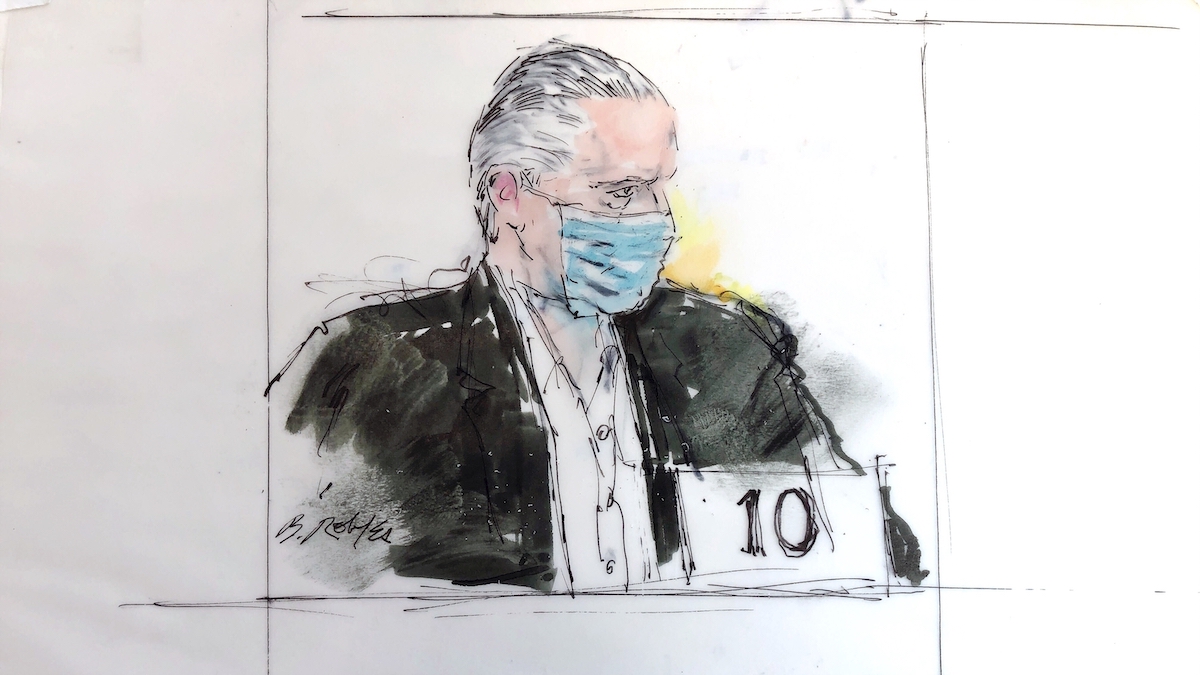

In this September 16, 2016 file photo, Defense Secretary Gen. Salvador Cienfuegos, left, and Mexico’s President Enrique Peña Nieto, salute during the annual Independence Day military parade in Mexico City’s main square. (AP Photo/Rebecca Blackwell, File)
By LARRY NEUMEISTER, MICHAEL R. SISAK and MARK STEVENSON, Associated Press
One American official said Mexico threatened to expel the Drug Enforcement Administration’s regional director and agents unless the U.S. dropped the case. But it was not immediately clear what other pressure Mexico was applying. The official requested anonymity because he was not authorized to speak about the case.
A judge in New York City approved the dismissal of charges, capping a lightning-fast turnaround in the case of former Gen. Salvador Cienfuegos, who was arrested just weeks ago in Los Angeles, but will be returned to Mexico under an unusual diplomatic deal between the two countries.
The decision to drop the case was an embarrassment for the United States, which had touted the arrest as a major breakthrough when Cienfuegos was taken into custody October 15. But the arrest drew a loud protest from top officials in Mexico and threatened to damage the delicate relationship that enables investigators in both countries to pursue drug kingpins together.
The U.S. cited America’s relationship with Mexico for dropping the case.
“The United States determined that the broader interest in maintaining that relationship in a cooperative way outweighed the department’s interest and the public’s interest in pursuing this particular case,” Seth DuCharme, the acting U.S. Attorney in Brooklyn, told the judge at a hearing.
He said the decision to drop the charges was made by Attorney General William Barr.
Cienfuegos was secretly indicted by a federal grand jury in New York in 2019. He was accused of conspiring with the H-2 cartel in Mexico to smuggle thousands of kilos of cocaine, heroin, methamphetamine and marijuana while he was defense secretary from 2012 to 2018.
Prosecutors said intercepted messages showed that Cienfuegos accepted bribes in exchange for ensuring the military did not take action against the cartel and that operations were initiated against its rivals. He was also accused of introducing cartel leaders to other corrupt Mexican officials.
Mexican officials complained that the U.S. failed to share evidence against Cienfuegos and that his arrest came as a surprise. It also caused alarm within Mexico’s military, which has played a crucial role in operations against drug cartels.
Mexico has repeatedly extradited major drug suspects, including at least some former elected officials, for trial in the United States. In the case of Cienfuegos, Mexican officials have taken no official position on whether he is innocent or guilty, saying that was up to the attorney general’s office to decide.
But they have depicted his return as a victory for Mexico’s sovereignty and its demand to be treated as an equal partner by the United States, an odd position given that most think that Mexico’s court system —and corrupt officials— are the weak links in the country’s fight against drug trafficking.
Mexican Foreign Relations Secretary Marcelo Ebrard said Wednesday that he told Barr that the U.S. had to choose between trying Cienfuegos and having continued cooperation.
“It is in your hands. You can’t have both,” Ebrard said he told Barr. “You cannot have close cooperation with all of Mexico’s institutions and at the same time do this.”
While Ebrard said he did not threaten any “specific action,” like limiting U.S. agents in Mexico, he said of Barr: “I imagine it worried him.” He also said he called in U.S. Ambassador Christopher Landau to express Mexico’s displeasure.
President Andrés Manuel López Obrador said Mexico’s Attorney General’s Office would decide whether Cienfuegos was placed in custody once he is returned. But given that there are no charges yet in Mexico, he is likely to be set free.
“This does not signify impunity; it means that an investigation will be started,” López Obrador said.
“Gen. Cienfuegos returns to Mexico as a free man,” Ebrard said.
It is rare for a highly prized defendant in a U.S. case to be arrested and then released in short order for reasons of diplomacy. Historically, it has been more likely to occur in cases involving espionage than drug trafficking.


In this Oct. 16, 2020, court artist sketch, former Mexican defense secretary Gen. Salvador Cienfuegos Zepeda’s appears in federal court in Los Angeles. =(Bill Robles via AP, File)
U.S. prosecutors in Manhattan have recently resisted diplomatic efforts by another U.S. ally, Turkey, to get charges dropped against a large state-owned bank accused of violating sanctions on Iran.
Cienfuegos, a general who led Mexico’s army department for six years under then-President Enrique Peña Nieto, was the highest-ranking former Mexican Cabinet official arrested since top security official Genaro Garcia Luna was arrested in Texas in 2019.
Analysts said Cienfuegos is unlikely to face charges in Mexico.
“That is not going to happen, we all know it,” columnist Carlos Loret de Mola wrote in the newspaper El Universal. “He will return to Mexico and be set free, because that is the promise that President López Obrador made to the army.”
Under an agreement signed by prosecutors and the general, Cienfuegos would depart the U.S. for Mexico “expeditiously in the custody of the U.S. Marshals,” Judge Carol Bagley Amon said. He would not be able to contest his removal or claim asylum in the U.S.
Outside the Brooklyn courthouse, defense attorney Edward Sapone said he expected Cienfuegos to be returned to Mexico on Wednesday. He noted that Cienfuegos has pleaded not guilty and had planned to prove his innocence.
“We’re very blessed justice was done today,” Sapone said as people protesting his client’s release carried signs and chanted nearby. He added that his client’s plans “in the immediate future are to remain with his family as a free man.”
Cienfuegos spoke little in court, answering a few questions from the judge through an interpreter.
Barr said in a statement Tuesday that the Justice Department would drop its case so Cienfuegos could be investigated under Mexican law.
“I have no reason to doubt the sincerity of the government’s position,” Amon said in granting the request to drop the case.
In a joint statement with Mexican Attorney General Alejandro Gertz Manero, Barr said that the U.S. Justice Department had made the decision to drop the case in recognition “of the strong law enforcement partnership between Mexico and the United States, and in the interests of demonstrating our united front against all forms of criminality.”
The Justice Department said it has provided Mexico with evidence collected in the case.
López Obrador has entrusted Mexico’s army and navy with a broader range of tasks than most other previous Mexican presidents, and he faced pressure to win Cienfuegos’ return.
The old ruling Institutional Revolutionary Party had previously called on Mexico’s government to pay Cienfuegos’ legal fees, and on Tuesday it celebrated the decision to drop the charges. Party leader Alejandro Moreno wrote in his Twitter account that the party “resolutely supports Gen. Salvador Cienfuegos…. We should all congratulate ourselves and always support our armed forces.”
Mike Vigil, the Drug Enforcement Administration’s former chief of international operations, said the decision “is nothing more than a gift, a huge gift” from President Donald Trump to López Obrador, probably given as a favor for past help on immigration issues.
He said the chances of Cienfuegos being convicted in Mexico are “slim to none,” noting the former defense secretary’s political connections in Mexico and the country’s idolization of the military.
***
Associated Press writer Joshua Goodman in Miami contributed to this report.



[…] STATES/MEXICO: The United States government dropped drug trafficking and money-laundering charges against Mexico’s former Defense Chief Salvador Cienfuegos Zepeda after Mexican officials […]